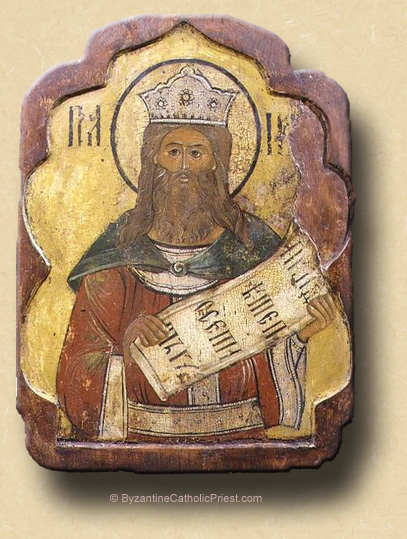Don't Hold Your Breath for This Movie to Come Out. II Kings 11:1-4,9-18,20.
Psalm 132:11-14,17-18.
Matthew 6:19-23. The Eleventh Friday of Ordinary Time. Readings from Cycle II of the feria, according to the Ordinary Form of the Roman Rite.
Return to ByzantineCatholicPriest.com. |
 10:13 AM 6/21/2014 — The Gospel lessons for this time after Trinity Sunday are very brief, and contain some very familiar teachings of Our Lord; and, for those of us who are accustomed to reading the Scriptures and who attend Mass daily it can even be ponderous to try and pound something new out of them day in and day out. That's why, the last time I was with you, I lighted on our Responsorial Psalm, and made a point about that. I've yet to speak about the Old Testament readings because, at this time of year, the Church is taking us through the Second Book of Kings, which is very thick going indeed. It's almost like trying to read the The Lord of the Rings: it makes sense when you watch the distilled version in the movie, but if you actually try and read the book it can be very confusing. And since the homily at a weekday Mass—if there is one—should be very brief indeed, it doesn't make sense to try and tackle anything from the Second Book of Kings. But today we might give it a shot. 10:13 AM 6/21/2014 — The Gospel lessons for this time after Trinity Sunday are very brief, and contain some very familiar teachings of Our Lord; and, for those of us who are accustomed to reading the Scriptures and who attend Mass daily it can even be ponderous to try and pound something new out of them day in and day out. That's why, the last time I was with you, I lighted on our Responsorial Psalm, and made a point about that. I've yet to speak about the Old Testament readings because, at this time of year, the Church is taking us through the Second Book of Kings, which is very thick going indeed. It's almost like trying to read the The Lord of the Rings: it makes sense when you watch the distilled version in the movie, but if you actually try and read the book it can be very confusing. And since the homily at a weekday Mass—if there is one—should be very brief indeed, it doesn't make sense to try and tackle anything from the Second Book of Kings. But today we might give it a shot.
To make a very long story very short, King Jehoram is dead, and his rightful heir, Jehoiada, is pushed out by the usurper, Ahaziah, and his mother, Athaliah. Ahaziah is killed, and Athaliah decides to rule in his stead, but she is not devout, and takes the people away from the covenant with the Lord and lapses into the worship of the pagan god, Baal. Jehoiada, who has been hidden away in the Temple of the Lord all this time, emerges to overthrow Athaliah, orders the temples of Baal to be destroyed, kills all the pagan priests, and restores the covenant with the Lord. Somehow, I don't think the movie version is forthcoming.
Our separated brethren have always had a problem with Catholic teaching on the Covenant because it offends their Protestant sensibilities; and, because we live in a Protestant society, it can effect how we think about our faith as well. We tend to rebel against the idea of a quid pro quo, that if I do this, than God will do that; but, this has been a part of Salvation History since the days of Abraham: it pervades the Old Testament, it's reflected in the many moral lessons of Our Lord in the Gospels, in the Church's centuries-old teaching about indulgences, and is especially present in the Message of Fatima, wherein Our Lady makes certain requests of us, in return for which we will receive certain graces. Not only is it not un-scriptural, it is a recurring theme in Holy Writ.
King David lights upon this is our Responsorial Psalm today, when he sings, “...if thy sons hold fast to my covenant, to the decrees which I make known to them, their sons too shall reign on thy throne for ever” (132:12).
Let us pray during this Mass, and each day of our lives, that we will continually renew our commitment to living out our covenant with God, which begins with our obedience to the Ten Commandments, and finds its flourishing in our joyful acceptance of the teachings of Holy Mother Church.

|

